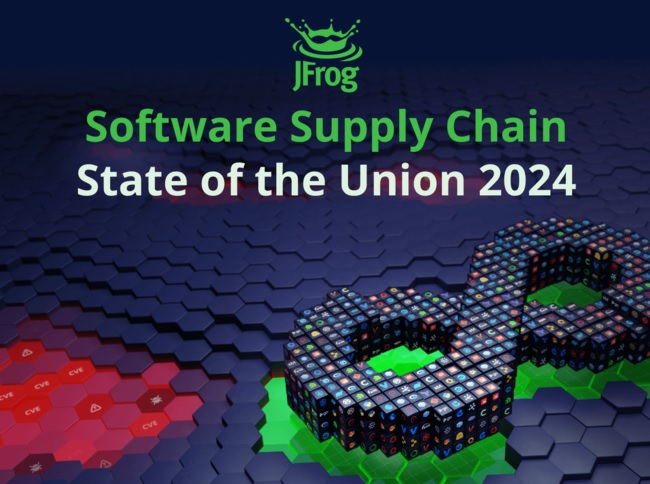JFrog announced a new machine learning (ML) lifecycle integration between JFrog Artifactory and MLflow, an open source software platform originally developed by Databricks.
Security is taking a toll on productivity, according to the Software Supply Chain State of the Union report from JFrog.
48% of survey respondents said it typically takes a week or longer to get approval to use a new package/library, extending time to market for new apps and software updates.
Additionally, approximately 25% of security teams' time is spent remediating vulnerabilities, even when those vulnerabilities may be overrated or even non-exploitable given their current context.

Source: JFrog
More key findings of the report include:
Not all CVEs are what they seem
Traditional CVSS ratings look purely at the severity of the exploit as opposed to the likelihood it will be exploited, which requires context to make an effective assessment. The JFrog Security Research team downgraded the severity of 85% of Critical CVEs and 73% of High CVEs on average after analyzing 212 different high-profile CVEs discovered in 2023. Additionally, JFrog found that 74% of the reported common CVEs with High and Critical CVSS scores on the top 100 Docker Hub community images weren't exploitable.
Denial of Service (DoS) attacks reign
Of the 212 high-profile CVEs analyzed for the report, 37.4% of them held the potential for a DoS attack vs. 19% with the potential to perform Remote Code Execution (RCE). This is good news for security organizations in the sense that RCE has a far more detrimental impact vs. DoS attacks due to their ability to offer full access to backend systems.
Applying security checks is inconsistent across SLDC
The industry seems to be split pretty evenly down the middle when it comes to deciding where to apply application security testing across the software development lifecycle (SDLC), underscoring the importance of shifting left and right simultaneously.
42% of developers claim it's best to perform security scans during code writing while 41% say it's best to perform scans on new software packages before bringing them into your organization from an Open-Source Software (OSS) repository.
Security tool sprawl continues
Nearly half of IT professionals (47%) say they use between four and nine application security solutions. However, a third of survey respondents and security professionals (33%) say they're using 10 or more application security solutions. This supports a market-wide trend of needing security tooling consolidation with a movement away from point solutions.
Disproportionate use of AI/ML tools for security
While 90% of survey respondents indicate their organization currently uses AI/ML-powered tools in some capacity to assist in security scanning and remediation efforts, only one in three professionals (32%) claim their organization uses AI/ML-powered tools to write code, indicating the majority are still wary of the potential vulnerabilities Gen-AI developed code can introduce to enterprise software.
"Vulnerabilities are growing in number year over year, but that does not necessarily mean they are growing in severity. It's clear that IT teams are willing to invest in new tools to bolster their security, but knowing where to put those tools, use their team's time, and streamline processes is critical to keeping their SDLC secure," said Shachar Menashe, Sr. Director, JFrog Security Research.
Methodology: The Software Supply Chain State of the Union report combines JFrog Artifactory developer usage data amongst 7K+ organizations, original CVE analysis by the JFrog Security Research team, and commissioned third-party survey data of 1,200 technology professionals worldwide to provide context into the broad, rapidly evolving software supply chain landscape.
Industry News
Copado announced the general availability of Test Copilot, the AI-powered test creation assistant.
SmartBear has added no-code test automation powered by GenAI to its Zephyr Scale, the solution that delivers scalable, performant test management inside Jira.
Opsera announced that two new patents have been issued for its Unified DevOps Platform, now totaling nine patents issued for the cloud-native DevOps Platform.
mabl announced the addition of mobile application testing to its platform.
Spectro Cloud announced the achievement of a new Amazon Web Services (AWS) Competency designation.
GitLab announced the general availability of GitLab Duo Chat.
SmartBear announced a new version of its API design and documentation tool, SwaggerHub, integrating Stoplight’s API open source tools.
Red Hat announced updates to Red Hat Trusted Software Supply Chain.
Tricentis announced the latest update to the company’s AI offerings with the launch of Tricentis Copilot, a suite of solutions leveraging generative AI to enhance productivity throughout the entire testing lifecycle.
CIQ launched fully supported, upstream stable kernels for Rocky Linux via the CIQ Enterprise Linux Platform, providing enhanced performance, hardware compatibility and security.
Redgate launched an enterprise version of its database monitoring tool, providing a range of new features to address the challenges of scale and complexity faced by larger organizations.
Snyk announced the expansion of its current partnership with Google Cloud to advance secure code generated by Google Cloud’s generative-AI-powered collaborator service, Gemini Code Assist.
Kong announced the commercial availability of Kong Konnect Dedicated Cloud Gateways on Amazon Web Services (AWS).
Pegasystems announced the general availability of Pega Infinity ’24.1™.




